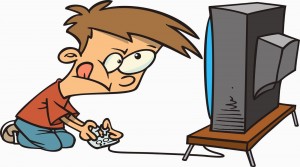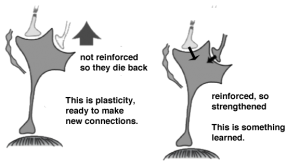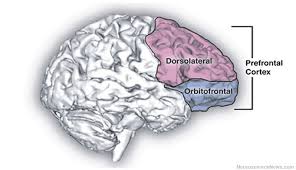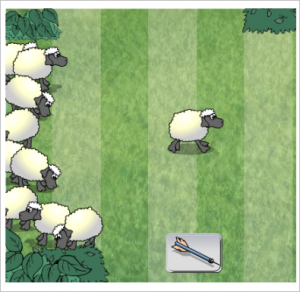 Why, hello there!
Why, hello there!
We just remembered a certain, troubling myth going around that certain brain-training games can improve your memory and problem solving in regular life. These games, created by learning companies, such as Lumosity and Cogmed, promise to slow cognitive decline and improve your overall learning capacity as long as you stick to playing their games regularly. The main question we at Brainbusters want to answer is, can something like a brain-training video game or puzzle improve short term memory and visual memory in life in general? Let’s dive right on in!
What allows the brain to retain memories and learn is the concept of brain plasticity. This plasticity literally changes the mapping of our brains and causes strengthened connections and altered routes/connections between neurons. So, when you learned as a child to ride a bike, you spent hours and hours practicing it until your brain changed at the neurological level to hold that long term memory (WOAH!). In almost all peoples, plasticity is most vibrant and reactive in childhood and declines steadily during aging. Learning something requires rehearsal over and over again, which is why those brain-games given by Lumosity and others require that you follow their strict regimen of practice for it to potentially work, and since plasticity decreases with age, more and more rehearsal is needed for older individuals.
to ride a bike, you spent hours and hours practicing it until your brain changed at the neurological level to hold that long term memory (WOAH!). In almost all peoples, plasticity is most vibrant and reactive in childhood and declines steadily during aging. Learning something requires rehearsal over and over again, which is why those brain-games given by Lumosity and others require that you follow their strict regimen of practice for it to potentially work, and since plasticity decreases with age, more and more rehearsal is needed for older individuals.
 When playing those puzzles and games, your brain has to store in active, working memory how the game is played and what the objective is. A game that requires you to solve a sudoku puzzle may be incredibly difficult, so within your brain at the prefrontal cortex, your working memory attempts to remember strategies and rules in order to solve it faster and faster with each repetition. This is why some of us are crazy good at crossword puzzles, and the rest take hours to do one alone! Anyway, the prefrontal cortex processes working memory in a way that, with enough repetition, will store those skills into long term memory.
When playing those puzzles and games, your brain has to store in active, working memory how the game is played and what the objective is. A game that requires you to solve a sudoku puzzle may be incredibly difficult, so within your brain at the prefrontal cortex, your working memory attempts to remember strategies and rules in order to solve it faster and faster with each repetition. This is why some of us are crazy good at crossword puzzles, and the rest take hours to do one alone! Anyway, the prefrontal cortex processes working memory in a way that, with enough repetition, will store those skills into long term memory.
These games certainly provide stimulation, and as we grow older stimulation for the brain is good in order to maintain brain plasticity and activity. The more a neuron is worked, the more active it is. However, these games only help develop skills for very specific situations. If you want to be the best sudoku player on the planet, have at it! But if you want to get better at knitting, then playing a variation of chess on the computer or phone may not help. When given a specific situation and task, the well-learned and well-rehearsed tasks in the short term and long term can activate place cells. These place cells, according to the cognitive map theory, fire when in particular situations or locations and signal familiarity to a task or location. When you play that Lumosity game, you prune those place cells and neurons around them to learn those skills very well.
However, these games will not always help develop generic life skills or incr ease overall intelligence or help stave off certain diseases such as Alzheimer’s, the last case being claimed by very few developers. They increase your skills for those specific tasks, but when it comes to creating novel skills that generalize to all situations in the real world, taking a walk or spending time socializing with other people would be more effective. A game that trains you to react more quickly to a specific stimulus, such a sheep suddenly running across the screen when you have to click as soon as you see it, may generalize to some stimuli such as reacting to a ball flying at your head, but it also may not since the stimulus, a ball versus a sheep on a screen, do not match up. Interactions with other people or doing physical activity activates more working memory cells as a smell can bring back vivid memories from long term and stimulate cells involved in short term memory. The brain training games are games, and for the BrainBusters, rather than playing a brain training game to help us get healthy and stimulated, we much prefer reading a good book.
ease overall intelligence or help stave off certain diseases such as Alzheimer’s, the last case being claimed by very few developers. They increase your skills for those specific tasks, but when it comes to creating novel skills that generalize to all situations in the real world, taking a walk or spending time socializing with other people would be more effective. A game that trains you to react more quickly to a specific stimulus, such a sheep suddenly running across the screen when you have to click as soon as you see it, may generalize to some stimuli such as reacting to a ball flying at your head, but it also may not since the stimulus, a ball versus a sheep on a screen, do not match up. Interactions with other people or doing physical activity activates more working memory cells as a smell can bring back vivid memories from long term and stimulate cells involved in short term memory. The brain training games are games, and for the BrainBusters, rather than playing a brain training game to help us get healthy and stimulated, we much prefer reading a good book.
Now, our conclusion? Plausible! A puzzle or brain-training game can help your short term, working memory in some ways but, those skills are not very generalizable.
As for developers’ claims that they will make your brain better in any and every way possible?
Sources:
A Consensus on the Brain Training Industry from the Scientific Community. (2014, October 20). Retrieved October 21, 2015, fromhttp://longevity3.stanford.edu/blog/2014/10/15/the-consensus-on-the-brain-training-industry-from-the-scientific-community-2/
Independent Video Games [Digital image]. (n.d.). Retrieved October 21, 2015, from http://www.horsefun.org/independent-video-games/
Jones, F. (2015, September 21). Types of Puzzle Video Games [Digital image]. Retrieved October 21, 2015, from http://www.heatseekerz.net/types-of-puzzle-video-games/
Prefrontal Cortex [Digital image]. (2012, September 17). Retrieved October 21, 2015, from http://inside-the-brain.com/2012/09/17/what-stress-does-to-your-brain/
Synaptic Plasticity 2 [Digital image]. (2011). Retrieved October 21, 2015, from http://thealienproject.blogspot.com/2011/11/the-best-cure-for-insomnia-is-to-get.html
Ward, Jamie. The Student’s Guide to Cognitive Neuroscience. Hove, East Sussex: Psychology Press, 2010.


Be First to Comment